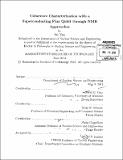Coherence characterization with a superconducting flux qubit through NMR approaches
Author(s)
Yan, Fei, Ph. D. Massachusetts Institute of Technology
DownloadFull printable version (25.62Mb)
Other Contributors
Massachusetts Institute of Technology. Department of Nuclear Science and Engineering.
Advisor
David G. Cory.
Terms of use
Metadata
Show full item recordAbstract
This thesis discusses a series of experimental studies that investigate the coherence properties of a superconducting persistent-current or flux qubit, a promising candidate for developing a scalable quantum processor. A collection of coherence characterization experiments and techniques that originate from the field of nuclear magnetic resonance (NMR) are implemented. In particular, one type of dynamical decoupling techniques that uses refocusing pulses to recover coherence is successfully realized for the first time. This technique is further utilized as a noise spectrum analyzer in the megahertz range, by which a 1/f-type dependence is observed for the flux noise. Then, a novel method of performing low-frequency noise spectroscopy is developed and successfully implemented. New techniques used in the readout scheme and data processing result in an improved spectral range and signal visibility over conventional methods. The observed power law dependence below kilohertz agrees with separate measurements at higher frequencies. Also, the noise is found to be temperature independent. Finally, a robust noise spectroscopy method is presented, where the spin-locking technique is employed to extract noise information by measuring the driven-evolution longitudinal relaxation. This technique shows improved accuracy over other methods, due to its insensitivity to low-frequency noise. Spectral signatures of coherent fluctuators are resolved, and further confirmed in a time-domain spin-echo experiment.
Description
Thesis (Ph. D.)--Massachusetts Institute of Technology, Dept. of Nuclear Science and Engineering, 2013. Cataloged from PDF version of thesis. Includes bibliographical references (pages 191-200).
Date issued
2013Department
Massachusetts Institute of Technology. Department of Nuclear Science and EngineeringPublisher
Massachusetts Institute of Technology
Keywords
Nuclear Science and Engineering.